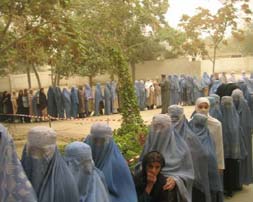In 1964 women helped to draft Afghanistan’s third constitution, which gave women the right to vote and opened the doors of elected office to women. Throughout most of the 1960s and 1970s, women saw increased participation in politics. Ruqiyyah Habib Abu Bakr, Masumah Ismati Wardak and Dr. Anahita Ratibzad were elected as members of parliament subsequent to adoption of the third constitution, while Humaira Malikyar Saljuqi and Azizah Gardizi were appointed as senators. In addition, in the formation of the 1965 cabinet of ministers women were included at top levels in the government. Kubra Nurzai became Minister of Public Health and was re-appointed to the same post in 1967. In 1969 Shafiqah Ziyai was appointed minister without portfolio; she was re-appointed in 1971.
In 1965 the People’s Democratic Party of Afghanistan, a Soviet-backed socialist organization was formed. Different factions of this party called for the gradual and sometimes rapid improvement of women’s rights. The same year also saw the formation of the first women’s political group, the Democratic Organization of Afghan Women. The main objectives of this organization were to eliminate illiteracy among women, ban forced marriages, and do away with the bride price (monies paid to the family of the wife upon marriage). Women continued to participate in Afghan politics from the 1970s through the early 1990s; however, this participation was largely restricted to urban areas.
Women’s absence from the public sector during the reign of the Taliban meant that women were excluded from any role in the political process, including all forms of formal or informal governance.
On November 27, 2001, United Nations negotiations on a transitional government for Afghanistan began in Bonn, Germany. Representatives of four Afghan groups participated, representing the Rome process (linked to the former king), the United Front, the Cyprus Group, and the Peshawar Group. The UN had encouraged all of the groups to include women in their delegations, and Afghan women’s organizations were asked to contact the four groups to seek participation in the talks. Two women, Sima Wali and Rona Mansuri, participated as full delegates of the Rome process. Amena Afzali participated as a full delegate of the United Front, Seddiqa Balkhi participated as adviser to the Cyprus Group, and Fatana Gilani participated as adviser to the Peshawar Group. The Agreement on Provisional Arrangements in Afghanistan, pending the re-establishment of permanent government institutions, was signed in Bonn on December 5, 2001.
In response to requests from Afghan women, a number of non-governmental organizations, in collaboration with the Office of the Special Adviser on Gender Issues and Advancement of Women and the United Nations Development Fund for Women, convened the Afghan Women’s Summit for Democracy in Brussels in December of 2001. About forty Afghan women leaders from different ethnic, linguistic and religious backgrounds participated, three of whom had also attended the UN negotiations in Bonn.
Establishment of the Drafting Committee of the Constitutional Commission was announced on October 5, 2002. The nine-member committee, chaired by Vice President Shahrani, included two women; it prepared a preliminary draft of the constitution which was then passed to the Constitutional Review Commission. The 35-member commission included seven women and represented a rough cross-section of educated Afghans, including educators, lawyers, constitutional scholars and religious leaders.
Women were at the helm of two ministries which were part of the Interim Administration headed by Hamid Karzai. A brand-new department, the Ministry of Women’s Affairs, was headed by Sima Samar, a physician and founder of the Shuhada Organization — a network of clinics, hospitals and schools in Pakistan and central Afghanistan. Samar was also one of the five vice presidents of the Interim Administration. She is now the chairperson of the Afghanistan Independent Human Rights Commission. Suhaila Siddiq, a surgeon who continued to practice in Kabul throughout the Taliban regime, headed the Ministry of Public Health.
The Bonn Agreement stipulated that the new constitution would be adopted by a Constitutional Loya Jirga (“grand council”). President Karzai issued a decree on July 16, 2003, spelling out the mechanism by which the 500 delegates to this body would be selected. Almost 20 percent of the seats were reserved for women — 64 women representing Afghanistan’s 32 provinces, as well as at least six women representing the refugee population and another 25 women who would be directly appointed by the president. In total, the parliament would have a total of not less than 95 women, plus any other women who might be directly elected through the general secret ballot process.
In 2005, Dr. Habiba Sarabi was appointed as governor of Bimiyan Province by President Hamid Karzai. She is the first woman ever to be governor of any province in the country.
- Previous: Education
- Next: Employment



